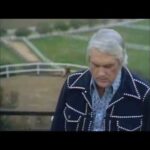The Last Farewell – Roger Whittaker
“The Last Farewell” by Roger Whittaker is one of those timeless songs that blend poetry, emotion, and melody so seamlessly that it feels like a letter set to music. Released in 1971 and later becoming a worldwide hit in the mid-1970s, it captures the ache of parting and the bittersweet weight of duty. The song is sung from the perspective of a man preparing to leave his homeland—possibly as a sailor heading off to war—who bids a tender goodbye to the woman he loves. Whittaker’s warm baritone voice and the orchestral arrangement give the song a deeply nostalgic and cinematic quality, evoking images of ships, shorelines, and distant horizons.
Lyrically, it’s both intimate and grand. The verses read like an old-fashioned love letter, full of longing and regret, yet the language carries an almost Shakespearean grace. Lines like “For you are beautiful, and I have loved you dearly, more dearly than the spoken word can tell” capture the purity of love that must endure separation. At the same time, there’s a quiet acceptance that fate—or duty—demands this farewell. It’s not a dramatic breakup or a story of betrayal; it’s the gentle sadness of two people bound by love but divided by circumstance.
The song’s arrangement also plays a big part in its emotional power. The lush orchestration swells with strings and brass, reflecting both the vastness of the sea and the depth of the singer’s feelings. Whittaker’s steady, expressive delivery grounds it all in sincerity. There’s no theatrical excess—just a man, his voice, and his heart laid bare. That balance between simplicity and grandeur is part of what made “The Last Farewell” resonate with so many listeners across generations.
Beyond its beauty, the song speaks to universal human experiences: saying goodbye, facing uncertainty, and carrying love across distance. It’s no wonder it struck such a chord with audiences worldwide, even reaching number one on several international charts. More than fifty years later, “The Last Farewell” remains a haunting reminder that true goodbyes are rarely final—they echo, softly, through memory and time.








December 3, 2025 @ 10:31 pm
Me again. Drove my daughters crazy with RW!! Loved it.
November 27, 2025 @ 8:17 am
Beautiful RW. RIP.
November 11, 2025 @ 4:08 pm
Oh does this bring back memories! Got to see him twice in Germany, and twice here! What a wonderful voice. My husband dared me to go on stage after one of his concerts here. I did…..and I reached up and gave him a quick kiss!! Never in my wildest dreams…….I quickly exited the stage! I am now 88 years and I will never forget that day! He was a dear and talented man. Thank you Roger!!